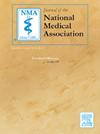Impact of Pre-operative COVID-19 Diagnoses on Post-operative Outcomes in Laparoscopic Cholecystectomy: A Matched Cohort Analysis
IF 2.3
4区 医学
Q1 MEDICINE, GENERAL & INTERNAL
引用次数: 0
Abstract
Introduction
Laparoscopic cholecystectomy is the standard treatment for gallbladder disease, but post-operative complications can vary based on patient comorbidities. Recent studies have highlighted the consequences of a COVID-19 diagnosis on procedures of multiple organ systems. The robust detrimental effects of COVID-19 continue to impact patient outcomes beyond respiratory-related procedures and extend to surgical procedures across various specialties. Findings have shown that a pre-operative COVID-19 diagnosis leads to an increase in surgical complications and post-operative recovery. However, the implications of a COVID-19 diagnosis for laparoscopic cholecystectomy complications and post-operative outcomes remain less understood. This study investigates the impact a COVID-19 diagnosis has on patients’ hospitalization duration, time to surgery, and post-operative outcomes.
Methods
The National Surgical Quality Improvement Program (NSQIP) database was used to analyze data from laparoscopic cholecystectomy procedures performed in participating hospitals between 2021 and 2022. A 1:2 propensity score matched group analysis was conducted to evaluate differences in post-operative complication rates, time to surgery, total operation time, and hospital length of stay between patients with and without a pre-operative COVID-19 diagnosis. Patients were categorized into two cohorts: those with a pre- operative COVID-19 diagnosis and those without. Patients with pre-existing severe comorbidities, severe pneumonia, hypercoagulability (or those on anticoagulant therapy), and those requiring an unplanned conversion from laparoscopic to open surgery were excluded from the analysis. Propensity scores were generated using logistic regression and modeled using demographic and pre- operative clinical features. Patient outcomes were assessed using GGE marginal models with matched groups as clusters and robust standard errors. GEE Link functions used were logit for binary outcomes and log for quantitative outcomes.
Results
A total of 2,583 patients who underwent laparoscopic cholecystectomy were analyzed, with 1,722 in the PreOp COVID-negative group and 861 in the PreOp COVID-positive group. Following propensity score matching, baseline characteristics were well-balanced between cohorts. Patients with pre-operative COVID-19 had a higher risk of post-operative complications (OR = 2.01, 95% CI: 1.45– 2.77, p < 0.001), with 8% experiencing complications compared to 4% in the non-COVID group. Time from admission to surgery was found to be significantly prolonged among PreOp COVID patients (1.61 days, 95%CI: 1.46-1.78 vs. 0.76 days, 95%CI: 0.70-0.84, p < 0.001). Additionally, they had a longer hospital stay (3.02 days, 95%CI: 2.77-3.28 vs. 1.53 days, 95%CI: 1.41-1.66, p < 0.001). Surgical duration was also significantly affected, with PreOp COVID patients requiring longer operative times (78.7 min, 95%CI:75.8- 81.6 vs. 68.89 min, 95%CI: 67.1-70.7, p < 0.001).
Conclusion
Pre-operative COVID-19 was associated with increased post-operative complications, increased time to surgery from admission, longer operative times, and prolonged hospital stays. These findings suggest that a history of pre-operative COVID-19 may impact surgical readiness and recovery, potentially leading to delays in care and adverse outcomes. Enhanced pre-operative screening and perioperative precautions may be warranted for patients with recent COVID-19 infections to improve post-operative outcomes.
术前COVID-19诊断对腹腔镜胆囊切除术术后预后的影响:一项匹配队列分析
腹腔镜胆囊切除术是胆囊疾病的标准治疗方法,但术后并发症可能因患者合并症而异。最近的研究强调了COVID-19诊断对多器官系统程序的影响。COVID-19的强大有害影响继续影响呼吸相关手术以外的患者结果,并扩展到各个专业的外科手术。研究结果表明,术前诊断COVID-19会导致手术并发症和术后恢复的增加。然而,COVID-19诊断对腹腔镜胆囊切除术并发症和术后结果的影响仍然知之甚少。本研究调查了COVID-19诊断对患者住院时间、手术时间和术后结果的影响。方法采用国家外科质量改进计划(NSQIP)数据库,对参与医院2021 - 2022年腹腔镜胆囊切除术的数据进行分析。采用1:2倾向评分匹配组分析,评估术前诊断为COVID-19的患者和未诊断为COVID-19的患者在术后并发症发生率、手术时间、总手术时间和住院时间方面的差异。患者分为两组:术前诊断为COVID-19的患者和未诊断为COVID-19的患者。先前存在严重合并症、严重肺炎、高凝性(或接受抗凝治疗)以及需要从腹腔镜转向开放手术的患者被排除在分析之外。倾向评分采用逻辑回归生成,并采用人口统计学和术前临床特征建模。使用GGE边际模型评估患者预后,匹配组为聚类,稳健标准误差。使用的GEE Link函数为二进制结果的logit和定量结果的log。结果共分析2583例腹腔镜胆囊切除术患者,其中PreOp covid阴性组1722例,PreOp covid阳性组861例。在倾向评分匹配之后,基线特征在队列之间得到了很好的平衡。术前感染COVID-19的患者出现术后并发症的风险较高(OR = 2.01,95% CI: 1.45 - 2.77, p < 0.001), 8%的患者出现并发症,而未感染COVID-19的患者出现并发症的风险为4%。术前COVID患者入院至手术时间明显延长(1.61天,95%CI: 1.46-1.78 vs. 0.76天,95%CI: 0.70-0.84, p < 0.001)。此外,他们的住院时间更长(3.02天,95%CI: 2.77-3.28 vs. 1.53天,95%CI: 1.41-1.66, p < 0.001)。手术时间也受到显著影响,术前COVID患者需要更长的手术时间(78.7 min, 95%CI:75.8- 81.6 vs. 68.89 min, 95%CI: 67.1-70.7, p < 0.001)。结论术前COVID-19与术后并发症增加、入院至手术时间增加、手术时间延长、住院时间延长有关。这些发现表明,术前COVID-19病史可能会影响手术准备和恢复,可能导致护理延误和不良后果。对于近期感染COVID-19的患者,有必要加强术前筛查和围手术期预防措施,以改善术后预后。
本文章由计算机程序翻译,如有差异,请以英文原文为准。
求助全文
约1分钟内获得全文
求助全文
来源期刊
CiteScore
4.80
自引率
3.00%
发文量
139
审稿时长
98 days
期刊介绍:
Journal of the National Medical Association, the official journal of the National Medical Association, is a peer-reviewed publication whose purpose is to address medical care disparities of persons of African descent.
The Journal of the National Medical Association is focused on specialized clinical research activities related to the health problems of African Americans and other minority groups. Special emphasis is placed on the application of medical science to improve the healthcare of underserved populations both in the United States and abroad. The Journal has the following objectives: (1) to expand the base of original peer-reviewed literature and the quality of that research on the topic of minority health; (2) to provide greater dissemination of this research; (3) to offer appropriate and timely recognition of the significant contributions of physicians who serve these populations; and (4) to promote engagement by member and non-member physicians in the overall goals and objectives of the National Medical Association.

 求助内容:
求助内容: 应助结果提醒方式:
应助结果提醒方式:


